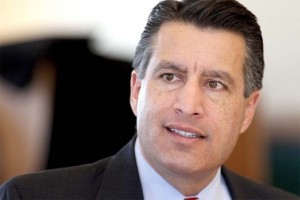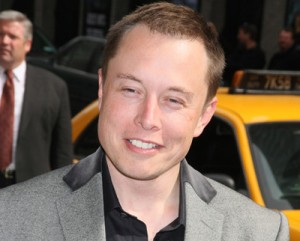Confirming widespread speculation, Nevada officials and top management from Tesla Motor Co. came together Thursday to announce that the battery-carmaker’s $5 billion Gigafactory would be built in Reno, a city until now better known for its gambling halls and resorts.
“Nevada is it,” proclaimed Tesla Founder and CEO Elon Musk.
But the project will come at a steep price, Nevada offering Tesla a mix of tax abatements and other incentives expected to be worth about $1.25 billion over the next 20 years. The price tag began to generate widespread criticism even before Nevada Gov. Brian Sandoval and Tesla CEO Musk staged their official announcement ceremony at the Carson City capital.
Declaring the news a “monumental announcement,” the governor set out to deflect criticism by focusing on the huge number of jobs that would be created even before the world’s largest battery plant opens, arguing that the payoff would be $100 billion in economic activity for Nevada over the next two decades.
Even though Tesla will effectively operate tax-free in the state, “This is a strong return for us,” Gov. Sandoval declared, equally to $80 for every dollar it will invest in incentives. Economic Development Director Steve Hill said the plant will deliver the equivalent of a 3% bump in the state’s GDP.
(Tesla “ready to feast” as it launches new models, says analyst. Click Here to find out why.)
The price tag is nonetheless more than double the $500 million that Tesla’s founder and CEO predicted it would take to win the Gigafactory when the project was announced earlier this year. And it reflects the significant battle that was waged, barely behind the scenes, as states across the country courted Tesla. Until recently, Nevada appeared to be facing serious challenges from California, Texas, New Mexico and Arizona.
While Gov. Sandoval pointed to a bipartisan mix of state and local officials on hand for the Thursday announcement, the project – and state payout – created a different sort of bipartisan alliance. Among others criticizing the cost are the conservative Nevada Policy Research Institute, as well as the liberal Progressive Leadership Alliance of Nevada.
Skeptics still hope to scuttle the effort, the state package requiring approval from lawmakers who will meet in a special session next week. But in a state still hurting from the Great Recession – which saw Nevada experience one of the biggest foreclosure rates in the country – the promise of thousands of good-paying jobs will have strong appeal.
(Quality concerns mount about Tesla Model S. Click Here for the story.)
More than 3,000 construction workers will be employed in preparing the huge battery plant as it approaches its 2017 launch of production. Once at full capacity, it is expected to employ 6,500, with an average paycheck of $25 an hour – “with excellent benefits,” the Governor emphasized. And the state and Tesla are together forecasting the creation of another 16,000 indirect jobs to support the plant.
There are still plenty of uncertainties in the project. Tesla has become one of the country’s best-selling battery-electric vehicle brands, demand now approaching 5,000 units a month. It expects to significantly boost that with next year’s launch of the Model X battery SUV, and will try to go mainstream a couple years later with the smaller Model 3. But it remains far from clear that demand will meet Tesla’s optimistic expectations.
(Tesla targeted by ad demanding changes in Model S. Click Here for the story.)
A key to that, analyst say, will be getting a new generation of lighter, smaller, more powerful – and significantly cheaper lithium-ion batteries. When Tesla began development of the Model S, the technology was believed to cost as much as $1,000 per kilowatt-hour, a hefty sum for the longest-range version of the maker’s current Model S, which uses an 84 kWh pack.
Prices have been dropping to around $400, but the Boston Consulting Group has estimated a figure in the range of $200 or lower would be needed to truly make battery-electric vehicles competitive. While Tesla has not set a specific target, it’s believed to be aiming for something in that range.
“I would like to recognize the leadership of Governor Sandoval and the Nevada Legislature for partnering with Tesla to bring the Gigafactory to the state,” said Tesla CEO Elon Musk, who also spoke at the Carson City news conference. “The Gigafactory is an important step in advancing the cause of sustainable transportation and will enable the mass production of compelling electric vehicles for decades to come.”



When you consider that tesla has lost 1.2 Billion so far, I would have to say that this is proof that ” there is a sucker born every minute”.
Musk is important because he is part of the left leaning environmental Nazi limousine liberal democratic political funding crowd and AGW alarmists (Automotive Global Warming Alarmists ) that helps sell electric cars. Not scientific expertise just like most of these folks . The end game for most are wealth redistribution (to themselves ) ,poitical influance perpetuity for left leaning democrats (to themselves ) . And for Musk additionaly Space X and a trip to Mars maybe he will get stranded there with dead
batterys ???
Then it’s settled obviously Nevada went the furthest above the baseline extortion terms Elon Musk demanded of the contestants !
Elon Musk is also conveniently the Chairman of Solar City in addition to his position as Chairman and CEO at Tesla electric automobiles.
New PHEV and BEV vehicles coming on line soon will challenge Tesla’s move into mainstream product . Ford Motor makes advanced PHEV and BEV traction batteries in house .
Ford Motor Co with their unique position of making their own in house BEV and PHEV traction batteries and vehicles on modified existing global platforms putsplatforms puts them in a unique position to challenge Toyota ,GM and Tesla BEV and PHEV
product lines at lower unit prod. cost .
Tesla is partnering with Panasonic for their BEV batteries .GM PHEV
and BEV batteries are from L.G. chemical Toyota ended it’s powertrain research
partnership with Tesla. They use Panasonic BEVand HEVC traction batteries .
Ford could be the awakening 800 lb gorilla in mainstream BEV and PHEV
vehicles
Ford has sold 53,014 electrified vehicles in the U.S. this year through
July Tesla’s U.S. sales may have totaled 10,401 vehicles in the first
seven months of this year, according to an estimate by Autodata Corp.
53,014 electrified vehicles, better known as Hybrid vehicles, are a little different than the fully electric vehicles that Tesla is making. As for the wealth factor, I don’t think Musk is in this for the greed. He is really trying to change the world. I hope he succeeds and we can make this world a better place.